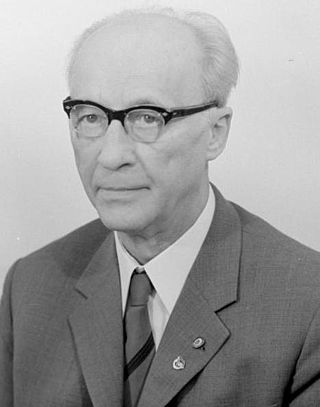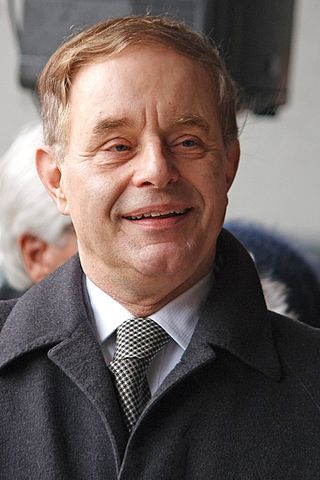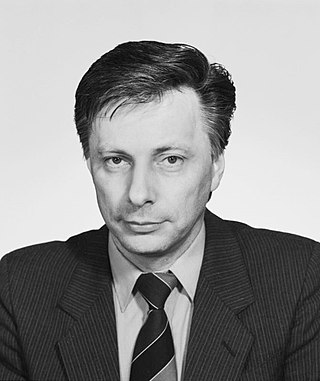
The Free Democratic Party is a liberal political party in Germany.
The German Democratic Party was a liberal political party in the Weimar Republic, considered centrist or centre-left. Along with the right-liberal German People's Party, it represented political liberalism in Germany between 1918 and 1933. It was formed in 1918 from the Progressive People's Party and the liberal wing of the National Liberal Party, both of which had been active in the German Empire.

The National-Democratic Party of Germany was an East German political party that served as a satellite party to the Socialist Unity Party of Germany (SED) from 1948 to 1989, representing former members of the Nazi Party, the Wehrmacht and middle classes. It should not be confused with the far-right National Democratic Party of Germany, which was a party in West Germany and continues as a minor non-governmental party in the modern united Germany.

The Christian Democratic Union of Germany was an East German political party founded in 1945. It was part of the National Front with the Socialist Unity Party of Germany (SED) and a bloc party until 1989.

The Liberal Democratic Party of Germany was a political party in East Germany. Like the other allied bloc parties of the Socialist Unity Party of Germany (SED) in the National Front, it had 52 representatives in the People's Chamber.

The Landtag of Bavaria, officially known in English as the Bavarian State Parliament, is the unicameral legislature of the German state of Bavaria. The parliament meets in the Maximilianeum in Munich.
The Association of Free Democrats was a liberal electoral coalition, later party, formed in East Germany on 12 February 1990. It originally consisted of the Liberal Democratic Party, the Free Democratic Party (GDR) and the German Forum Party. In the Volkskammer election of the 18 March 1990 the Association of Free Democrats, heavily supported by the West German Free Democratic Party, polled 5.28% of the votes and gained 21 seats, all parties running on the same lists. Most of the seats went to Liberal Democratic Party members, whose leader Rainer Ortleb became their parliamentary leader. It then participated in the last GDR government led by Lothar de Maizière.
The Progressive People's Party was a social liberal party of the late German Empire. It was formed in 1910, with the educated middle class and new lower middle class as its main constituents.

Johannes Dieckmann was a German journalist and politician who served as the 1st President of the Volkskammer, the parliament of East Germany, from 1949 to 1969.
This article aims to give a historical outline of liberalism in Germany. The liberal parties dealt with in the timeline below are, largely, those which received sufficient support at one time or another to have been represented in parliament. Not all parties so included, however, necessarily labeled themselves "liberal". The sign ⇒ denotes another party in that scheme.
This article gives an overview of liberalism in Latvia. It is limited to liberal parties with substantial support, mainly proved by having had a representation in the Saeima. The sign ⇒ denotes another party in that scheme. For inclusion in this scheme it isn't necessary so that parties labelled themselves as a liberal party.
This article gives an overview of liberalism and the historical radicalism movement within liberalism in Switzerland. It is limited to liberal and radical parties with substantial support, mainly proved by having had a representation in parliament. The sign ⇒ means a reference to another party in that scheme. For inclusion in this scheme it is not necessary that parties labeled themselves as a liberal party.

Tom Høyem is a Danish and German politician, and former headmaster in the European Schools.

Jörg van Essen is a German politician of the Free Democratic Party in the Bundestag.
Franz Xaver Kappus was an Austrian military officer, journalist, editor and writer who wrote poetry, short-stories, novels and screenplays. Kappus is known chiefly as the military academy cadet who wrote to Austrian poet Rainer Maria Rilke (1875–1926) for advice in a series of letters from 1902 to 1908 that were assembled and published in the best-selling book Letters to a Young Poet (1929).

Rainer Ortleb is a German academic and politician.

Bruno Menzel was a German politician and politician of the Free Democratic Party (FDP).









